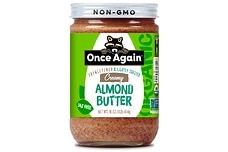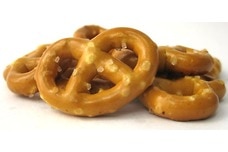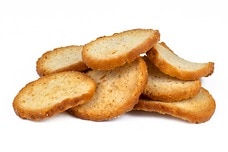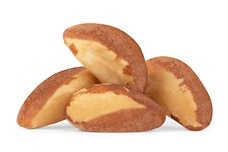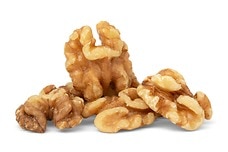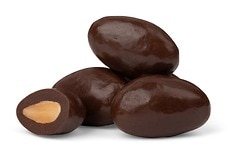8 Foods that Help You Sleep
The United States is full of insomniacs, with 50 to 70 million people having a diagnosable sleep or wakefulness disorder and many more suffering from insufficient sleep (Centers for Disease Control and Prevention, 2015). There are many strategies to improve your sleep, including setting a consistent bedtime, engaging in a bedtime ritual, turning off computer or phone screens 30 minutes before bed, and avoiding caffeine or alcohol (National Sleep Foundation, n.d.). Additionally, the foods you eat can help you sleep. Certain foods increase the levels of natural compounds that send sleepiness signals to your brain.
Natural Compounds in Food that Promote Healthy Sleep
Sleep is a complex physiological event that consists of several stages, each with its own unique features and physiological processes. As such, certain biological compounds affect our ability to enter the state of sleep. Perhaps the best known is tryptophan, the compound in turkey that makes you tired. Tryptophan is associated with feelings of sleepiness and shorter latency to fall asleep (Hartman, 1982).
Essential vitamins and minerals may also affect your ability to fall asleep. For instance, calcium appears to facilitate the body’s ability to absorb and use tryptophan (Knapp, Mandell, & Bullard, 1975). The mineral magnesium may also promote sleepiness and increase the amount of time you spend sleeping (Asp, 2014). Increasing your dietary consumption of these compounds can help you get better sleep.
8 Foods that Help You Sleep
Almonds
Almonds are an excellent source of magnesium, which has been shown to improve sleep quality. A one-ounce serving of almonds contains 75 mg of magnesium, approximately 19% of your recommended daily allowance (Self Nutrition Data, 2015a).
Fish
Eating fatty fish may help you slumber better at night. This is because fish are an excellent source of vitamin B6, also known as pyridoxine. In animal studies, vitamin B6 has been associated with greater synthesis of melatonin, an essential hormone for sleep (Viswanathan, Siow, Paulose, & Dakshinamurti, 1988). Vitamin B6 seems to regulate the release of serotonin, a neurotransmitter involved in the physiological arousal system, as well as melatonin.
Walnuts
Walnuts are a good source of the amino acid tryptophan. One serving of walnuts (about a handful) contains 318 mg of this beneficial amino acid (Self Nutrition Data, 2015b). Thus, eating a walnut-rich snack an hour or two before bed could help you drift off to sleep more easily.
Tart cherries
Cherries are naturally high in melatonin, the primary hormone involved in governing your sleep-wake cycle. In fact, in a small clinical trial, participants drank tart cherry juice concentrate (made from Montmorency cherries) for seven days (Howatson et al., 2012). The researchers found that after just one week, the participants who drank cherry juice had significantly higher levels of melatonin in their bodies. This was associated with greater time spent in bed, higher total sleep time, and better sleep efficiency. The benefits of cherries may not be limited to cherry juice. Eating dried tart cherries also supplies a source of melatonin.
Chamomile tea
Drinking a cup of herbal tea has long been promoted as a natural sleep aid. Research evidence backs this up. Drinking chamomile tea may increase your levels of glycine, a chemical that acts as a mild sedative (Jung, 2014). This helps you relax and achieve sleep more quickly.
Brazil nuts
Selenium is a mineral that is involved in the biochemical pathway that produces thyroid hormone (Deans, 2014). Thyroid imbalances can lead to sleep changes and lack of restful sleep. A diet that is low in selenium may make you more likely to have sleep problems. Brazil nuts are one of the best known sources of selenium, with one serving of the nuts containing 500 micrograms of the nutrient (Deans, 2014).
Leafy green vegetables
Leafy green vegetables such as kale, spinach, turnip greens, and mustard greens are excellent sources of calcium. The presence of calcium helps your brain use tryptophan to produce the sleep-promoting hormone melatonin (Jung, 2014). Eating a salad with dark leafy green vegetables for dinner can help you get the sleep you need.
Pretzels or chips
Pretzels and chips have a high glycemic index, meaning that they cause blood sugar levels to spike. While this is typically avoided in people who are diabetic, it can be helpful to promote sleep. This is because the insulin boost that comes with high blood sugar in healthy individuals helps to shuttle more tryptophan into your brain (Jung, 2014).
Considerations When Choosing Foods to Help You Sleep
Eating specific foods is just one strategy to help yourself get to sleep. However, eating particular foods -- no matter how rich in sleep-promoting nutrients -- is unlikely to help if you have poor sleep hygiene or an unrelated sleep disorder. Instead, combine your sleep-promoting diet with behavioral changes that help you get to sleep. Of particular importance is following a regular routine every night. Try to go to sleep and wake up at the same time every day, even on the weekends. This allows your body to adapt, promoting a regular circadian rhythm.
If your inability to get to sleep or stay asleep persists even after making behavioral changes and eating foods that help you sleep, it may be time to see a doctor. Visiting a sleep specialist for a sleep study can help you determine whether a sleep disorder or some other physiological condition is preventing you from getting the sleep you need.
Recipes to Support a Restful Sleep
Adding the foods listed above to your daily diet can certainly help facilitate healthy sleep, but doing so can be difficult for those set in unhealthy eating habits. Make the transition easy with these delectable recipes.
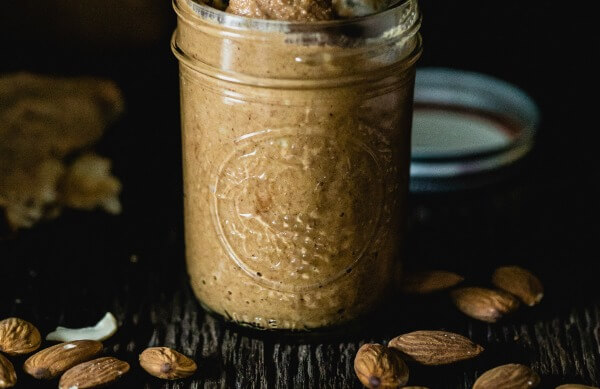
Almond Butter Recipe
Almond butter can be enjoyed as a spread on a sandwich, on crackers, or on any combination of fruits and vegetables. Create a fresh batch of this wholesome source of magnesium today!
Ingredients: Almonds, coconut oil, maple syrup, salt
Total Time: 45 minutes
| Yield: 2 cups
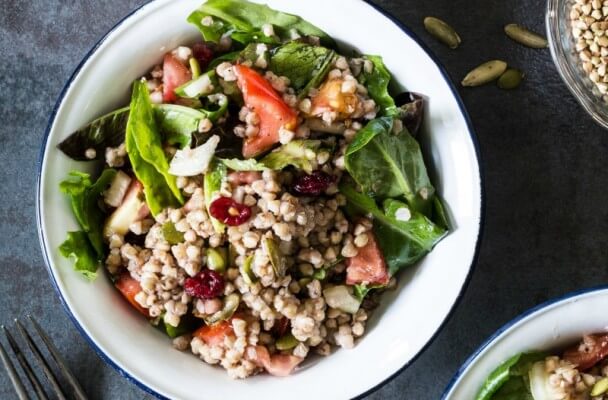
Buckwheat Salad Recipe
This delectable dish makes the perfect plate for lunch or dinner and offers a diverse selection of leafy greens to help you meet your nutritional needs, including the calcium intake needed to support a good night’s rest.
Ingredients: Mixed greens, buckwheat, tomatoes, onion, raw pumpkin seeds, dried cranberries, rice wine vinegar, sesame oil, salt, black pepper.
Total Time: 15 minutes
| Yield: 5 servings
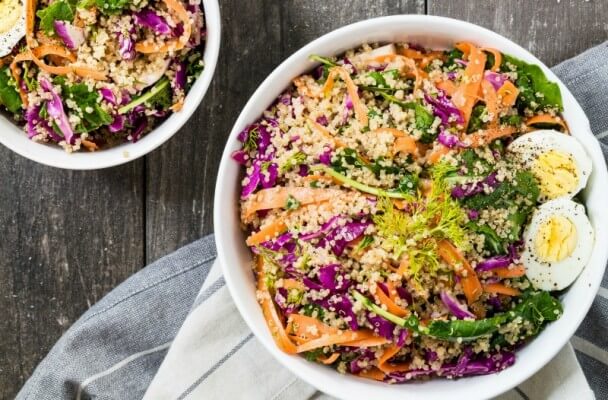
Kale Quinoa Salad Recipe
Another mouthwatering meal that acts as a medium for adding calcium to your plate, this delicious dish is an ideal selection for a hearty lunch to power the second-half of a long day.
Ingredients: Quinoa, fresh baby kale, purple cabbage, carrots, fresh dill, boiled eggs, rice wine, extra virgin olive oil, black pepper.
Total Time: 25 minutes
| Yield: 8 servings
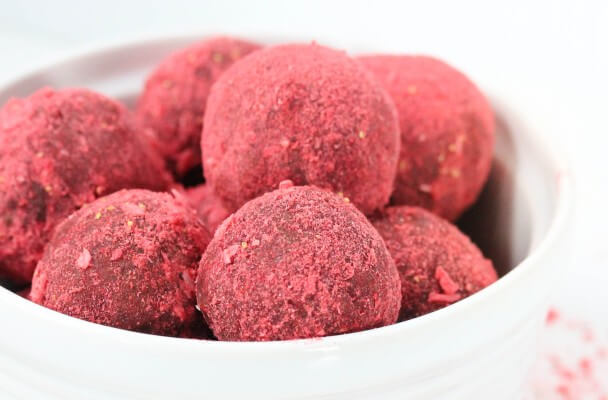
Almond Truffles Recipe {gluten-free, vegan}
More magnesium in the form of a delectable dessert defines the perfect nightcap in these decadent almond truffles. Almond butter and almond flour supply a double source of the mineral in this supremely scrumptious snack.
Ingredients: Pitted dates, almond flour, almond butter, water, flaxseed meal, freeze-dried raspberries, unsweetened shredded coconut.
Total Time: 15 minutes
| Yield: 14 - 16 truffles
Snacks to Support a Restful Sleep
These snacks combine the aforementioned foods with delightful tastes and textures to make it easy to add their sleep supporting nutritional content to your daily diet. For even more foods that are great for promoting a good night’s rest, check out our healthy late night snack page!
Healthy Eating
- Healthy Snacks
- Healthy Meals
- Healthy Recipes
- Sports Nutrition
- Nutrition and Special Diets
- 21 Day Fix
- 5 Popular Diet Similarities
- Alkaline Diet
- Anti-Inflammatory Diet
- Calorie Counting
- Carb Cycling Diet
- Celiac Disease
- Cholesterol
- Clean Eating
- Crohn's Disease
- DASH Diet
- Detox Diet
- Diabetes
- Diabetes Diet
- Diet Pill Dangers
- Fat Burning Foods
- Gluten-free Diet
- Glycemic Index
- Heart Health
- High Blood Pressure Diet
- High Fiber Foods
- How to Eat Healthy
- How to Lower Blood Pressure
- Hypertension
- IBS Diet
- Ketogenic Diet
- Liquid Diet
- Low GI Foods
- Low-Carb Diet and Foods
- Low-Fat High-Carb Diet
- Mediterranean Diet
- Mediterranean Diet Foods
- Military Diet
- Nutrition Labels Explained
- Paleo Diet
- Raw Food Diet
- Superfoods
- Sustainable Weight Loss
- Thrive Diet
- Vegan Diet
- Vegetarian Diet
- Weight Loss Shakes
- Whole30
- Vitamins, Minerals & Nutrients

